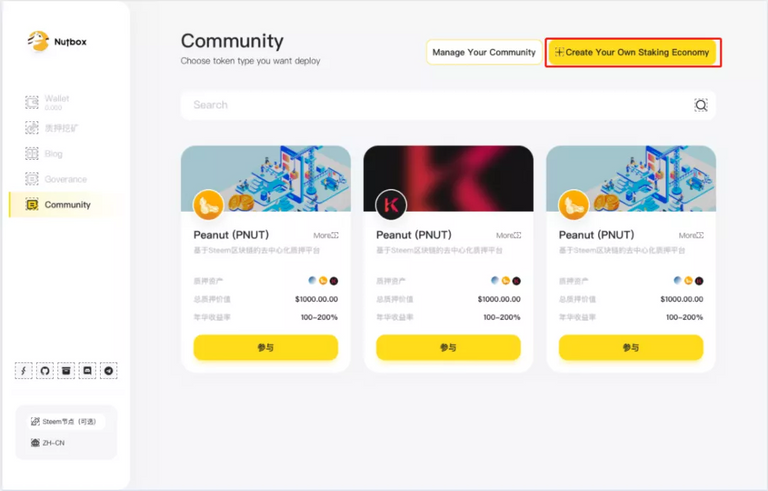Staking Economy is accompanied by Proof of Stake (PoS) in modern days of the crypto financial world.
The staking Economy reached its popularity after the EOS’s top 21 super node elections in 2018. After more than 3 years of rapid development, the market size has taken about 30% of the total cryptocurrency market. Locked assets were worth of 146.5 billion US dollars; and more than 20 billion US dollars in staking rewards are distributed every year.

Problems with the current Staking Economy structure
However, under such huge market, roughly 14% of the total market was controlled by the top 0.05% of the services providers; and the problem with these top services providers is that they are centralized institutions. Just like the cryptocurrency exchange before Uniswap launched.
This pattern has brought the following effects:
A small number of institutions control the security of the PoS networks.
As the Staking Economy is closely related to the underlying consensus of the PoS networks. Centralized institutions that provide staking services, controls many PoS network super nodes or validators nodes. PoS network consensus security is greatly challenged by the risk of a small number of institutions control.
In some PoS networks, a centralized organization operates multiple nodes; and sometimes they own more than half of super nodes or validators.
The existing "Stake A Get A" unprofitable ecological development
The original intention of the PoS consensus mechanism is to allow the holders of Staked assets to act as validators of nodes to jointly protect the security of the PoS network.
Not everyone can afford to be a staker. Whales which huge amount of stake that can easier satisfy the minimum betting requirement are often to be selected to produce blocks, while holders below the minimum betting requirement will never be permitted to produce.
The “Stake A Get A” method allows the low volume holders to give up their governance rights by staking their tokens to super nodes/validators that controls most equity. They become a pure financial investor; in return, they lose their power to manage the future development of the PoS network, and the network loses its security protection from decentralization.
Decentralized Staking

Nutboxes’ Walnut Network project belongs to the second phase of Nutbox ecosystem. It has been developed after the initial PNUT project, which supports mining by Delegation DeFi, and Polkadot/Kusama Slot Auction system.
This project aims to provide some hope of solving this risk. Walnut is a decentralized staking platform that allows anyone to create a decentralized staking pool, just as easy as creating a trading portfolio on Uniswap.
Walnut removes the restriction of becoming a super node or validator, so that anyone can create a decentralized staking pool to attract community members to participate in its Staking Economy and operate PoS network nodes.
In the Walnut network, multiple communities can operate a super node or validator, or a single community can on its own.
Walnut also provides the following services to enable the decentralized staking pool to develop into a richer decentralized service platform for communities, and even promote the development of the PoS network ecology.
- Using Walnut’s smart contract, community sponsors can initiate their own customized assets that rewards their staking participants. Depending on different configurations, holders of staked assets can obtain the original PoS token, or the community token,
- Community founders can create/manage their liquidity mining pools with one simple click. They can reward community members by rewarding community tokens; and community members are encouraged to provide liquidity for the training pairs created with community tokens. This is to build a free market that discovers the value of community tokens,
- Create a modulated staking protocol to all communities (Stake community token to obtain community token), community version of decentralized exchange, decentralized community blog, community version of NFT and other services,
- Configure the governance module of the community, and start the decentralized governance of the community through a proposal voting system based on community media.
Build your own decentralized platform
Base on the services provided by the upcoming Nutbox Walnut Network, anyone can easily create a decentralized pledge platform, a community DeFi platform, a decentralized content platform, and a decentralized NFT or a game platform.
Nutbox Walnut Network’s decentralized pledge solution has long been tested in the Peanut community. On October 20, 2020, Peanut, a decentralized pledge platform based on the Steem blockchain (DPoS mechanism), was launched.
Up to now, Peanut has developed into the second largest Staking platform & the largest DeFi platform in the Steem network. The staked assets on Peanut have reached 8.17 million STEEM POWER, accounting for 6% of the entire network.
Nutbox Walnut Network will open beta in August, so stay tuned.
The road ahead is long, and you and I build a different world together.
Article by Nutbox Founder Iguozi, translated from
https://mp.weixin.qq.com/s/oXyI7QtMwMaQckqcHvWKEQ
Congratulations @nutboxna! You have completed the following achievement on the Hive blockchain and have been rewarded with new badge(s) :
Your next target is to reach 100 upvotes.
You can view your badges on your board and compare yourself to others in the Ranking
If you no longer want to receive notifications, reply to this comment with the word
STOP